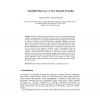Free Online Productivity Tools
i2Speak
i2Symbol
i2OCR
iTex2Img
iWeb2Print
iWeb2Shot
i2Type
iPdf2Split
iPdf2Merge
i2Bopomofo
i2Arabic
i2Style
i2Image
i2PDF
iLatex2Rtf
Sci2ools
119
Voted
DIS
2006
Springer
2006
Springer
Scientific Discovery: A View from the Trenches
One of the primary goals in discovery science is to understand the human scientific reasoning processes. Despite sporadic success of automated discovery systems, few studies have systematically explored the socio-technical environments in which a discovery tool will ultimately be embedded. Modeling day-to-day activities of experienced scientists as they develop and verify hypotheses provides both a glimpse into the human cognitive processes surrounding discovery and a deeper understanding of the characteristics that are required for a discovery system to be successful. In this paper, we describe a study of experienced faculty in chemistry and chemical engineering as they engage in what Kuhn would call "normal" science, focusing in particular on how these scientists characterize discovery, how they arrive at their research question, and the processes they use to transform an initial idea into a subsequent publication. We discuss gaps between current definitions used in discove...
DIS 2006 | Discovery Science | Discovery System | Processes Surrounding Discovery | Theoretical Computer Science |
Related Content
| Added | 22 Aug 2010 |
| Updated | 22 Aug 2010 |
| Type | Conference |
| Year | 2006 |
| Where | DIS |
| Authors | Catherine Blake, Meredith Rendall |
Comments (0)

